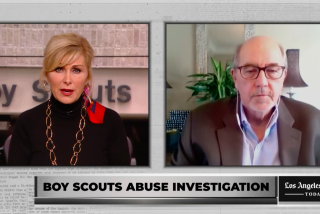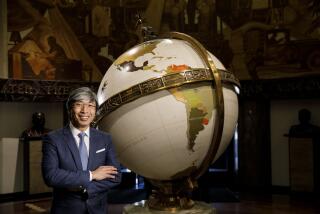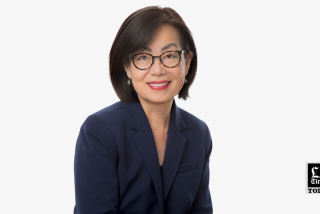Bob Gibson, former L.A. Times foreign editor, dies at 89
Robert W. Gibson, a veteran journalist and editor known for dramatically transforming a paltry Los Angeles Times foreign desk, died Friday at Huntington Hospital in Pasadena after suffering several health issues, including pneumonia. He was 89.
At 6 feet 4 and known for lumbering about with his bald head down in thought, Gibson cut a formidable figure in the newsroom, an image that belied his compassion for reporters and knack for magic tricks.
His fascination for foreign reporting was ignited when he found himself covering the Korean War at 22, enthralled by his seasoned peers. Multiple overseas experiences would eventually inform his role as foreign editor of The Times, where he was tasked by publisher Otis Chandler with enhancing a scant staff. As the paper’s international bureaus increased, so did its esteem.
“Until Bob we had no reputation for foreign coverage — it was virtually non-existent,” said Alvin Shuster, who succeeded Gibson in the position. “I think we had maybe two or three people at most. As the staff grew and we got to more than 30, obviously our coverage became more extensive, analytical and complete.”
Raised in St. Louis, Gibson was accepted to Harvard University but declined after his father, an executive with Procter & Gamble, was transferred to California. The family settled in San Marino, and Gibson, an only child, chose Stanford University so he could stay close.
He graduated in 1950 after studying journalism and political science and thought he had landed a job with the Long Beach Press-Telegram — until the offer was quickly rescinded when North Korea invaded South Korea and the paper didn’t want to hire someone who would soon be drafted.
Gibson then met up with a friend in Honolulu, where he stayed after being hired by what was then United Press Associations, the agency that would send him to Korea.
Drafted by the Army at 26 and placed in a public information office, he went on to write for McGraw-Hill Inc.’s news service in London. Known for refusing to go off the record, he once secured an interview with J. Paul Getty by tracking down the oil tycoon’s hotel.
While a correspondent in Moscow — where he and his first wife, Carol, spent two grueling winters under Soviet rule — the journalist declined a request by the Russian government to become a spy.
The couple lived in New York while Gibson was an associate editor for Business Week but left for Los Angeles after a doctor suggested that their son’s respiratory condition might be improved by a new locale. Their three children — Christopher, Paula and Valerie — would grow up in La Cañada Flintridge and South Pasadena.
In 1964, less than a year after starting at The Times as the economics columnist for the editorial section, Gibson was handed the helm of the foreign desk.
“He felt so strongly about the importance of good journalism and putting reporters into positions around the world, particularly in countries where there had been a great deal of repression,” recalled Tom Johnson, who became the paper’s publisher in 1980.
“He believed in opening up the world for information, knowing as much as we could in places where a free press didn’t exist.”
Under Gibson, foreign reporters flew first class and were provided staff assistance in the field. Narrative writing was encouraged and often made the front page. The Times became known as a destination paper, and résumés piled up.
Among Gibson’s hires was the late William Tuohy, who won a Pulitzer Prize in 1969 for his coverage of the Vietnam War.
“Bob’s genius was hiring people who could work without direction,” former Times correspondent Kenneth Freed said. “I loved him because he didn’t run things, he didn’t interfere. He hired you to do a good job and you did it.”
Gibson had his detractors, and his hands-off approach could frustrate those who wanted guidance.
But reporters recall with affection how the editor responded when correspondent Joe Alex Morris Jr. was killed by a sniper in Tehran. Gibson was shaken by the death and directed a complicated operation that involved tracking down Morris’ body and sending a company-paid jet for its retrieval, despite Iran’s closed borders.
He also made daily phone calls to Morris’ wife. A German citizen who had never lived in the States before, she was persuaded to move to Los Angeles and take a job in the Times’ public relations department.
Gibson said, “ ‘You have three children and not much money in the bank, so we will hire you,’ ” recalled Ulla Morris-Carter, 85. “He had hired my late husband and felt somewhat responsible to look after me, and he certainly did.”
In 1983, Gibson was ousted as foreign editor and became the paper’s international economics correspondent. By then he had settled in Pasadena and married his second wife, Esmeralda, a copy chief at the Times who became a news editor.
“He was the most interesting man I’d ever met,” she said. “It didn’t matter which side of the political spectrum you were on; you would respect what he was saying when you analyzed the various issues. We could talk for hours and did still to the end.”
Gibson took a generous buyout in 1991 and spent his retirement playing tennis, traveling and indulging his penchant for magic, a craft he learned in high school that amused his four grandsons. He and his wife auditioned for and secured magician memberships at the exclusive Magic Castle in Hollywood.
Slowed by a bum knee, sleep apnea and lung disease brought on by years of heavy smoking, Gibson in his later life relied on the help of an at-home caregiver but kept up his night-owl habits and could be found in the wee hours of the morning in his den recliner, poring over a stack of historical biographies, magazines and newspapers.
More to Read
Start your day right
Sign up for Essential California for news, features and recommendations from the L.A. Times and beyond in your inbox six days a week.
You may occasionally receive promotional content from the Los Angeles Times.







